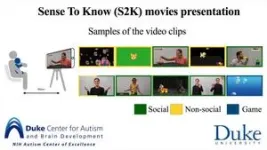(Press-News.org) DURHAM, N.C. – Researchers at Duke University have demonstrated an app driven by AI that can run on a tablet to accurately screen for autism in children by measuring and weighing a variety of distinct behavioral indicators.
Called SenseToKnow, the app delivers scores that evaluate the quality of the data analyzed, the confidence of its results and the probability that the child tested is on the autism spectrum. The results are fully interpretable, meaning that they spell out exactly which of the behavioral indicators led to its conclusions and why.
This ability gives health care providers detailed information on what to look for and consider in children referred for full assessments and intervention. SenseToKnow’s ease of use and lack of hardware limitations, combined with its demonstrated accuracy across sex, ethnicity and race, could help eliminate known disparities in early autism diagnosis and intervention by allowing autism screening to take place in any setting, even in the child’s own home.
The results appear online October 2 in the journal Nature Medicine.
“Autism is characterized by many different behaviors, and not all children on the spectrum display all of them equally, or at all,” said Geraldine Dawson, director of the Duke Center for Autism and Brain Development, who is a co-senior author on the study. “This screening tool captures a wide range of behaviors that more accurately reflect the complexity and variability found in autism.”
Recent research has shown promising results from tracking children’s eye movements in response to specially designed movies that can help diagnose autism in a clinical setting. SenseToKnow, the researchers say, detects a wider range of behaviors such as facial expression, gaze patterns, head movements and blink rate. It also incorporates an on-screen bubble-popping game to assess motor movement and skills, as delays in motor skills are one of the earliest signs of autism.
The app uses almost every sensor in the tablet’s arsenal to measure and characterize the child’s response without the need for any sort of calibration or special equipment. It then uses AI to analyze the child’s responses to predict how likely it is that the child will be diagnosed with autism.
“The AI we’ve built compares each child’s biomarkers to how indicative they are of autism at a population level,” said Sam Perochon, a PhD student working in the laboratory of Guillermo Sapiro, the James B. Duke Distinguished Professor of Electrical and Computer Engineering and co-senior author of the study. “This allows the tool to capture behaviors other screening tests might miss and also report on which biomarkers were of the most interest and most predictive for that particular child.”
The AI tool is able to provide scores for both the quality of data that the app was able to capture as well as its level of confidence in its own analysis—both of which, the researchers believe, are a novel feature.
“This is an important aspect for a health care provider to know, just like they would need to know if a blood test did not have a big enough sample to produce reliable results,” said Matias Di Martino, assistant research professor of electrical and computer engineering at Duke, who co-led the analysis of the study with Sapiro and Perochon.
In the study, SenseToKnow was administered to 475 children during a pediatric well-child visit, 49 of whom were subsequently diagnosed with autism and 98 with developmental delay without autism. The app showed 87.8% sensitivity for detecting autism, meaning it correctly identified most children with the condition. Its specificity—the percentage of children without autism who screened negative—was 80.8%.
Overall, participants who screened positive for autism using the app had a 40.6% probability of subsequently being diagnosed with the condition. In comparison, only about 15% of children who screen positive using the standard parent questionnaire are later diagnosed with autism. Combining the app with the standard questionnaire boosted the probability of a positive screen resulting in later diagnosis to 63.4% -- meaning fewer children are falling through the cracks.
The American Academy of Pediatrics recommends that every toddler be screened for autism at 18 and 24 months. However, concerns have been raised that current screening methods that rely solely on parent reporting are missing children. Girls and children of color, in particular, are often missed.
SenseToKnow’s ability to detect autism was similar across children of different sexes, races and ethnicities. While the researchers do not envision the digital screening tool replacing parent reporting, they believe it is important to augment the subjective questionnaire with objective tools to help close the gap.
“Just like when any patient goes to their doctor, the doctor listens to them describe what they are experiencing, but they also use thermometers and other objective tests to provide additional information to guide next steps and referrals for further evaluation,” Dawson said. “Such objective tests have been missing for autism.”
The researchers are currently conducting a study in which parents deliver the app at home. They hope that the app will also be useful for measuring a child’s progress within an early intervention program as well as to studying the effectiveness of such programs.
“There is a wide range of expertise amongst health care providers in knowing and being able to recognize all the potential signs of a child being on the autism spectrum,” Dawson said. “This app could help clinicians focus on the areas in which the child needs help, as well as identify areas of strength.”
This research was supported by the National Institutes of Health (NICHD Autism Centers of Excellence Research Program P50HD093074, R01MH121329, R01MH120093) and the Simons Foundation. The team is also partially supported by the National Science Foundation and the Department of Defense.
“Early detection of autism using digital behavioral phenotyping.” Sam Perochon, J. Matias Di Martino, Kimberly L. H. Carpenter, Scott Compton, Naomi Davis, Brian Eichner, Steven Espinosa, Lauren Franz, Pradeep Raj Krishnappa Babu, Guillermo Sapiro & Geraldine Dawson. Nature Medicine, Oct. 2, 2023. DOI: 10.1038/s41591-023-02574-3
# # #
END
Tablet-based AI app measures multiple behavioral indicators to screen for autism
A 10-minute app can accurately screen for autism in children by automatically detecting a wide range of behavioral characteristics, going beyond one indicator of autism.
2023-10-02
ELSE PRESS RELEASES FROM THIS DATE:
Advanced bladder cancer patients could keep their bladder under new treatment regime, clinical trial shows
2023-10-02
New York, NY (October 2, 2023)—Mount Sinai investigators have developed a new approach for treating invasive bladder cancer without the need for surgical removal of the bladder, according to a study published in Nature Medicine in September. Removing the bladder is currently a standard approach when cancer has invaded the muscle layer of the bladder.
In a phase 2 clinical trial that was the first of its kind, doctors found that some patients could be treated with a combination of chemotherapy and immunotherapy without the need to remove their bladder. ...
Plant chloroplasts promise potential therapy for Huntington’s disease
2023-10-02
Researchers at the University of Cologne’s CECAD Cluster of Excellence for Aging Research and the CEPLAS Cluster of Excellence for Plant Sciences have found a promising synthetic plant biology approach for the development of a therapy to treat human neurodegenerative diseases, especially Huntington’s disease. In their publication “In-planta expression of human polyQ-expanded huntingtin fragment reveals mechanisms to prevent disease-related protein aggregation” in Nature Aging, they showed that a synthetic enzyme derived from plants – stromal processing peptidase (SPP) – reduces the clumping of proteins responsible for the pathological changes ...
Contagious cancers in cockles sequenced, showing unexpected instability
2023-10-02
CONTAGIOUS CANCERS IN COCKLES SEQUENCED, SHOWING UNEXPECTED INSTABILITY
Transmissible cancers in cockles — marine cancers that can spread through the water — have been sequenced for the first time, unearthing new insight into how these cancers have spread across animal populations for hundreds, possibly thousands, of years.
The study, from researchers at the Wellcome Sanger Institute, the CiMUS research centre at the Universidade de Santiago de Compostela in Spain, and collaborators across multiple countries, found that these cockle tumours are highly genetically unstable. The cancer ...
Massive low earth orbit communications satellites could disrupt astronomy
2023-10-02
Observations of the BlueWalker 3 prototype satellite show it is one of the brightest objects in the night sky, outshining all but the brightest stars.
Astronomers have raised concerns that without mitigation, groups of large satellites could disrupt our ability to observe the stars from Earth and perform radio astronomy.
Several companies are planning ‘constellations’ of satellites – groups of potentially hundreds of satellites that can deliver mobile or broadband services anywhere in the world.
However, these satellites need to be in ‘low-Earth’ orbit and can be relatively large, ...
Nerve cells can detect small numbers of things better than large numbers of things
2023-10-02
When two, three or four apples are placed in front of us, we are able to recognize the number of apples very quickly. However, we need significantly more time if there are five or more apples and we often also guess the wrong number. In fact, the brain does actually register smaller numbers of things differently than larger ones. This has been demonstrated in a recent study by the University of Tübingen, University of Bonn and the University Hospital Bonn. The results were published in the magazine Nature ...
Boston Children’s Hospital researchers uncover insights into the developmental trajectory of autism
2023-10-02
In a groundbreaking study published in JAMA Pediatrics on October 2, 2023, researchers at Boston Children’s Hospital shed new light on the evolving nature of Autism Spectrum Disorder (ASD) diagnoses in early childhood. Diagnosing ASD at a young age is important for early intervention and treatment, but this new study suggests that not all kids continue to meet the criteria for ASD as they get older.
The team found that 37% of children diagnosed with ASD as toddlers no longer meet the criteria for ASD around the age of six. Children with lower adaptive skills—essential everyday abilities encompassing communication, self-care, and decision-making—tend ...
Sustainable protection of rapidly subsiding coastlines with mangroves
2023-10-02
Vulnerable coastlines
Unfortunately, precisely in these rural densely populated Asian regions, mangroves have in the past been cleared to free up land for other uses such as aquaculture. This has made these coasts vulnerable to rapid erosion. Restoring mangroves seems a logical solution to reverse this process and protect these densely populated coastlines. However, this requires understanding if mangroves can cope with extreme rates of relative sea level rises, as experienced in these subsiding areas.
Since 2015 NIOZ researcher Celine van Bijsterveldt visited Indonesia regularly during her studies and her Phd. ...
Boreal and temperate forests now main global carbon sinks
2023-10-02
Using a new analysis method for satellite images, an international research team, coordinated by the French Alternative Energies and Atomic Energy Commission (CEA) and INRAE, mapped for the first time annual changes in global forest biomass between 2010 and 2019. Researchers discovered that boreal and temperate forests have become the main global carbon sinks. Tropical forests, which are older and degraded by deforestation, fire and drought, are nearly carbon neutral. The findings, published in Nature Geoscience, highlight the importance of accounting for young forests and forest ...
Differences in mortality rates for fatal cerebral haemorrhage between Finnish university hospitals
2023-10-02
Subarachnoid haemorrhage (SAH) is one of the most dangerous cerebrovascular disorders, with as many as 40% of patients dying within one month of the event.
A study recently published in the esteemed Neurology journal investigated whether there are differences in the prognosis of SAH patients between the university hospital districts in Finland. The research dataset was composed of nearly 10,000 SAH cases from 1998 to 2017, including information on patients who died before receiving neurosurgical care.
Prognoses ...
Smooth avatar-user synchronization for the metaverse
2023-10-02
Mobile phones, smartwatches and earbuds are some gadgets that we carry around physically without much thought. The increasingly digitalised world sees a shrinking gap between human and technology, and many researchers and companies are interested in how technology can be further integrated into our lives.
What if, instead of incorporating technology into our physical world, we assimilate ourselves into a virtual environment? This is what Assistant Professor Xiong Zehui from the Singapore University of Technology ...
LAST 30 PRESS RELEASES:
ASU researchers to lead AAAS panel on water insecurity in the United States
ASU professor Anne Stone to present at AAAS Conference in Phoenix on ancient origins of modern disease
Proposals for exploring viruses and skin as the next experimental quantum frontiers share US$30,000 science award
ASU researchers showcase scalable tech solutions for older adults living alone with cognitive decline at AAAS 2026
Scientists identify smooth regional trends in fruit fly survival strategies
Antipathy toward snakes? Your parents likely talked you into that at an early age
Sylvester Cancer Tip Sheet for Feb. 2026
Online exposure to medical misinformation concentrated among older adults
Telehealth improves access to genetic services for adult survivors of childhood cancers
Outdated mortality benchmarks risk missing early signs of famine and delay recognizing mass starvation
Newly discovered bacterium converts carbon dioxide into chemicals using electricity
Flipping and reversing mini-proteins could improve disease treatment
Scientists reveal major hidden source of atmospheric nitrogen pollution in fragile lake basin
Biochar emerges as a powerful tool for soil carbon neutrality and climate mitigation
Tiny cell messengers show big promise for safer protein and gene delivery
AMS releases statement regarding the decision to rescind EPA’s 2009 Endangerment Finding
Parents’ alcohol and drug use influences their children’s consumption, research shows
Modular assembly of chiral nitrogen-bridged rings achieved by palladium-catalyzed diastereoselective and enantioselective cascade cyclization reactions
Promoting civic engagement
AMS Science Preview: Hurricane slowdown, school snow days
Deforestation in the Amazon raises the surface temperature by 3 °C during the dry season
Model more accurately maps the impact of frost on corn crops
How did humans develop sharp vision? Lab-grown retinas show likely answer
Sour grapes? Taste, experience of sour foods depends on individual consumer
At AAAS, professor Krystal Tsosie argues the future of science must be Indigenous-led
From the lab to the living room: Decoding Parkinson’s patients movements in the real world
Research advances in porous materials, as highlighted in the 2025 Nobel Prize in Chemistry
Sally C. Morton, executive vice president of ASU Knowledge Enterprise, presents a bold and practical framework for moving research from discovery to real-world impact
Biochemical parameters in patients with diabetic nephropathy versus individuals with diabetes alone, non-diabetic nephropathy, and healthy controls
Muscular strength and mortality in women ages 63 to 99
[Press-News.org] Tablet-based AI app measures multiple behavioral indicators to screen for autismA 10-minute app can accurately screen for autism in children by automatically detecting a wide range of behavioral characteristics, going beyond one indicator of autism.








